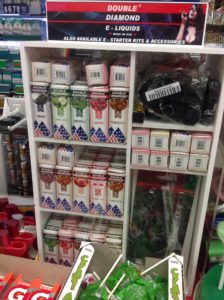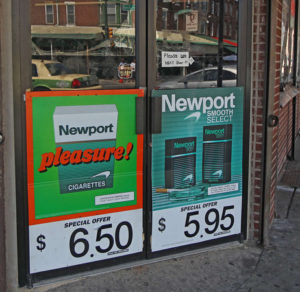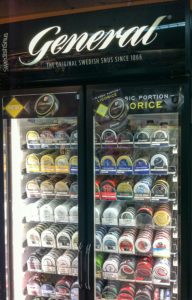Welcome to CounterTobacco.org’s “News and Research Roundup!” Each month we post a summary of the latest research, reports, and news stories on counteracting tobacco product sales and marketing at the point of sale (POS). Keeping up with what’s happening in the POS movement all across the country can help you choose policies and strategies that work best for your community. New research can help provide support for your work and evidence for the importance of the “War in the Store.” Have a story you don’t want us to miss? E-mail it to us!
New Research
Tobacco 21
- Tobacco 21 policies in California and Hawaii and sales of cigarette packs: A difference-in-differences analysis, Tobacco Control
- An assessment of cigarette pack sales in California and Hawaii found that implementation of a Tobacco 21 policy was associated with a reduction of cigarette sales of 13.1% in California and 18.2% in Hawaii. Learn more about tobacco 21 policies.
- Development of a tobacco 21 policy assessment tool and state-level analysis in the USA, 2015-2019, Tobacco Control
- This article documents the establishment of a first-of-its-kind instrument that can be used to examine components of state-level Tobacco 21 policies. Learn more about tobacco 21 policies.
Menthol and Other Flavored Tobacco Products
- Advancing tobacco control through point of sale policies, Providence, Rhode Island, Preventing Chronic Diseases
- An evaluation of Providence, Rhode Island’s 2012 POS tobacco policies that restricted the sale of flavored tobacco products (except menthol) to tobacco bars and restricted price discounting and multi-pack offers for tobacco products found them to be effective, with a reduction in high school students’ use of any tobacco products from 22.2% to 12.1% and current use of e-cigarettes from 13.3% to 6.6% following two years of rigorous enforcement of the policy. The tobacco industry’s use of ambiguous flavor descriptors (e.g. Game “Blue” cigarillos) poses a challenge to enforcement of policies that restrict the sale of flavored tobacco products. However, rigorous enforcement, monitoring via store assessments, and retailer education significantly reduced violations in Providence. Learn more about restricting the sale of flavored tobacco products and restricting price discounts.
- Differences in price of flavoured and non-flavoured tobacco products sold in the USA, 2011-2016, Tobacco Control

- Analysis of data from 2011 to 2016 found that prices differed across flavored, non-flavored and menthol-flavored products, with menthol little cigars, moist snuff, and roll-your-own cigarettes being less expensive than their non-flavored counterparts. Learn more about flavored tobacco products.
- Flavour types used by youth and adult tobacco users in wave 2 of the Population Assessment of Tobacco and Health (PATH) Study 2014-2015, Tobacco Control
- Data from Wave 2 of the 2014-2015 Population Assessment of Tobacco and Health study confirm that prevalence of flavored tobacco use is highest among youth (ages 12-17) and show that menthol/mint, fruit, and candy/sweet were the most used flavor types at initiation and past 30 day use for all age groups. Within each age group, flavored use was greatest among hookah, e-cigarette, and snus users. Learn more about youth use of flavored tobacco products.
- Flavored Tobacco Product Use Among Middle and High School Students — United States, 2014–2018. MMWR
- During 2014–2018, current use of flavored electronic cigarettes increased among high school students and during 2015–2018 among middle school students. Even while use of any flavored tobacco product decreased from 73% to 67.4% among high school tobacco product users, use of flavored e-cigarettes increased from 65.1% to 67.8%. Learn more about youth use of flavored tobacco products.
- Association of flavored tobacco use with tobacco initiation and subsequent use among US youth and adults, 2013-2015, JAMA Network Open
- Analysis of longitudinal cohort data from PATH wave 1 and wave 2 found that most youth (71.9%) and young adult (57.6%) new tobacco users first experimented with a flavored product; as well, first use of a flavored tobacco product (menthol, mint, or other flavor), when compared to first use of a non-flavored product, was positively associated with subsequent use of tobacco products. Learn more about flavored tobacco products.
- Short-term impact of a flavored tobacco restriction: Changes in youth tobacco use in a Massachusetts community, American Journal of Preventive Medicine
- This study compared youth access to and use of flavored tobacco products between two Massachusetts communities, one of which had passed a flavored tobacco restriction six months prior. Flavored tobacco availability decreased by 70% in the community with the policy, whereas no significant difference was seen in the other community. As well, there was a significant difference in youth use of flavored and non-flavored tobacco products between the communities, with the community with the flavored tobacco sales restriction seeing decreased use and the other community seeing increased use. This study, which collected data using an online platform developed in collaboration with Counter Tools, highlights the significant effects a flavor ban can have, even in the short-term. Learn more about flavored tobacco restrictions.
- News Story: One town’s flavor ban seemed to work to cut youth tobacco use, CNN
- News Story: A tale of two cities: Impact of reducing teens’ access to flavored tobacco products, EurekAlert!
- This study compared youth access to and use of flavored tobacco products between two Massachusetts communities, one of which had passed a flavored tobacco restriction six months prior. Flavored tobacco availability decreased by 70% in the community with the policy, whereas no significant difference was seen in the other community. As well, there was a significant difference in youth use of flavored and non-flavored tobacco products between the communities, with the community with the flavored tobacco sales restriction seeing decreased use and the other community seeing increased use. This study, which collected data using an online platform developed in collaboration with Counter Tools, highlights the significant effects a flavor ban can have, even in the short-term. Learn more about flavored tobacco restrictions.
- Evaluating tobacco retailer experience and compliance with a flavoured tobacco product restriction in Boston, Massachusetts: Impact on product availability, advertisement and consumer demand, Tobacco Control
- Implementation of a policy restricting the sale of flavored tobacco products to adult-only retailers in Boston lead to reduced availability of flavored products at youth-accessible stores from 100% to only 14.4% of stores. In addition, the percent of retailers advertising flavored tobacco products decreased from 58.9% to only 28%. Consumers also generally asked for flavored products less following implementation of the policy. The study determined that educational visits and flavored product guidance lists assisted with retailer compliance. Learn more about restricting product availability.
E-Cigarettes
- Environmental contamination from e-cigarette, cigarette, cigar and cannabis products at 12 high schools – San Francisco Bay Area, 2018-2019, Morbidity and Mortality Weekly Report
- A garbology study of tobacco waste from 12 public high schools in California found that the large majority of Juul and Juul-compatible pods were found at schools with majority middle and upper-income students and nearly all pods were flavored; schools with predominately lower-income students had greater numbers of little cigars, cigarillos, and menthol cigarette butt waste. Learn more about e-cigarettes at the POS.
- News Story: Researchers went through high schoolers’ trash to find out which tobacco products they’re using. Here’s what they found, TIME
- Impact of non-menthol flavours in e-cigarettes on perceptions and use: an updated systematic review, BMJ Open

- A systematic review of 51 articles indicated that, among youth, e-cigarette flavors (not including menthol) decrease harm perceptions, increase experimentation, and increase initiation of e-cigarettes. Among adults, e-cigarette flavors increase product appeal and are cited as a main reason for use. Learn more about flavored tobacco products.
- News Story: E-cigarette flavors decrease perception of harm among youth, EurekAlert!
- E-cigarette Retail Licensing Policy and E-cigarette Use Among Adolescents, Journal of Adolescent Health
- This study found that an e-cigarette retail licensing requirement may be a useful policy tool in reducing e-cigarette use among adolescents. After an e-cigarette licensing policy was implemented in Pennsylvania, e-cigarette use among adolescents in the state dropped by 5.2% more than in New York and by 7.4% more than in Virginia, both states without e-cigarette licensing. Learn more about tobacco retailer licensing.
- E-cigarette health harm awareness and discouragement: Implications for health communication, Nicotine & Tobacco Research
- A convenience sample of U.S. adults assessed the extent to which different harms discouraged use of e-cigarettes. The harms that discouraged vaping the most were respiratory harm and exposure to chemicals while the harm that discouraged vaping the least was addiction – an important finding given that current FDA regulations on e-cigarette warnings only necessitate a warning for nicotine addiction. Learn more about health warnings at the POS.
- What are the respiratory effects of e-cigarettes?, BMJ
- Through a review of all relevant published literature, scientists evaluated the effects of e-cigarettes on respiratory health and found adverse consequences on organ and cellular health; they were incapable of determining the population-level effects of e-cigarette use, given lung disease generally takes decades to manifest. Given what is currently known about the effects of e-cigarettes, scientists cannot fully determine whether their use results in fewer adverse respiratory health effects than use of combustible tobacco products. Learn more about e-cigarettes at the POS.
- News story: Researchers publish comprehensive review on respiratory effects of vaping, EurekAlert
- Through a review of all relevant published literature, scientists evaluated the effects of e-cigarettes on respiratory health and found adverse consequences on organ and cellular health; they were incapable of determining the population-level effects of e-cigarette use, given lung disease generally takes decades to manifest. Given what is currently known about the effects of e-cigarettes, scientists cannot fully determine whether their use results in fewer adverse respiratory health effects than use of combustible tobacco products. Learn more about e-cigarettes at the POS.
Other
- Tobacco industry marketing exposure and commercial tobacco product use disparities among American Indians and Alaska Natives, Substance Use & Misuse
- Analysis of data from wave 1 of the Population Assessment of Tobacco and Health found that Non-Hispanic American Indians and Alaska Natives, which have the greatest prevalence of commercial tobacco use among US ethnic and racial groups, when compared to Non-Hispanic Whites, had greater exposure to retail (64.5% vs 59.3%), mail (20.2% vs 14.3%), and email (17% vs 10.6%) tobacco marketing, suggesting that the tobacco industry targets these groups disproportionately. Learn more about disparities in point of sale advertising.
- An argument for phasing out sales of cigarettes, Tobacco Control (September 21, 2019).
- This article provides analysis and logic for ending the tobacco epidemic (the ‘endgame’) through phasing out the sales of cigarettes. Learn more about policy solutions to phase out tobacco products.
Industry News
- E-cigarette sales slowing, led by Juul, amid negative headlines, CNBC
- Juul hires another top Altria executive, The Wall Street Journal
- Altria launches Iqos tobacco device in US, and the timing couldn’t be better, CNBC
- Reynolds files for FDA review of Vuse e-cigarettes, The Wall Street Journal
- Judge declines to extend substantial equivalence deadline to cigar industry, Cigar Aficionado
- Juul spent record $1.2 million lobbying as regulators stepped up, Bloomberg
POS Policy in the Media
E-Cigarettes
- Teen use of flavored e-cigarettes has continued to rise, report says, CNN
- US lawmaker introduces bill cutting nicotine in e-cigarettes amid teen vaping epidemic, CNBC
- Vaping follows the path Big Tobacco took years ago, facing lawsuits, health advisories and calls for regulation, Chicago Tribune
- Military post exchanges halt sales of vape-related products, KWTX
- Juul agrees to stop advertising to youth in settlement with Oakland nonprofit, San Francisco Chronicle
- E-cigarette giant Juul suspends sale of all fruity flavors head of looming US ban, CNBC
- FTC opens inquiry into e-cigarette industry’s marketing practices, CNBC
- Rutgers experts explore impact of e-cigarettes, vaping on marginalized populations, Newswise
- FDA warns popular vaping brand to stop selling 100 products, Fox4KC
- Trump considers retreat from ban of mint, menthol vaping flavors, The Washington Post
State E-Cigarette Bans
- Washington State orders emergency ban on flavored vape products, 5News
- Lawsuit seeks to overturn Washington’s ban on flavored vape products, Q13 Fox
- Utah puts emergency limits on flavored e-cigarettes, as vaping illnesses rise, The Salt Lake Tribune
- Vape shops take Utah health department to court over ban on flavored e-cigarettes, The Salt Lake Tribune
- Oregon governor announces temporary ban on flavored vaping products, OPB
- Oregon Court of Appeals puts halt on flavored vaping ban, Tillamook Headlight Herald
- Bullock directs temporary ban on flavored e-cigarettes, NBC Montana
- Montana judge halts temporary flavored vaping ban, The Charlotte Observer
- Judge blocks Michigan’s ban on flavored e-cigarettes, AP News
- Whitmer takes flavored vape case to Michigan Supreme Court, WWJ News
Local and Tribal E-Cigarette Bans
- States target vaping with bans. In California, the action is local, Kaiser Health News
- Puyallup Tribe temporarily bans flavored vaping products, King 5 News
- Amid hospitalizations, Philadelphia officials propose a flavored vape ban for minors, WHYY
- San Clemente officials move to block new smoke shops from opening near schools, parks, Voice of OC
Corporate E-Cigarette Bans
- H-E-B pulls electronic cigarettes from shelves, Spectrum Local News
- Kroger to stop selling e-cigarettes as vaping business becomes ‘increasingly complex’, The Dallas Morning New
- Schnucks to end tobacco sales effective January 1, 2020, BusinessWire
Tobacco 21
- Tobacco age minimum bill passes Pennsylvania Senate, ABC27
- ‘As difficult as possible’: You now must be 21 to buy cigarettes, vapes and other tobacco products in Maryland, The Baltimore Sun
- Anthony raises tobacco sales age to 21, and Golden Valley and St. Paul looking to consider it, Start Tribune
- Tuscon council increases age minimum to purchase tobacco, nicotine products, KOLD
- Scandia approves Tobacco 21 policy, Forest Lake Times
Menthol and Other Flavored Tobacco Products
- Flavored-tobacco products may be banned for sale in Burbank, LA Times
- A. County bans all flavored tobacco sales, from liquid pods to menthol cigarettes, KTLA
- Dinkins joins the fray of vaping, menthol debate amid racial concerns, Politico
- It’s time to eliminate all flavored cigarettes, not just the electronic kind, STAT
- Golden Valley considers overhauling tobacco ordinance, CCXMedia
Tobacco Retailer Licensing
- Denver bans tobacco sales to those under 21, requires sales license, The Denver Post
- Watsonville bans flavored tobacco, e-cigarettes and vapes, The Pajaronian
- Tobacco bans pass – with a few carveouts, Easy Reader News
- Capital beat: N.H. rolling out e-cigarette regulations as state gets first vaping illness, Concord Monitor
- Summit County enacts ordinance to limit number of tobacco sellers to curb youth use, KPCW
Find more stories in last month’s News and Research Roundup.
Know of a story that we missed? Email us, and we’ll be sure to include it in next month’s roundup!



